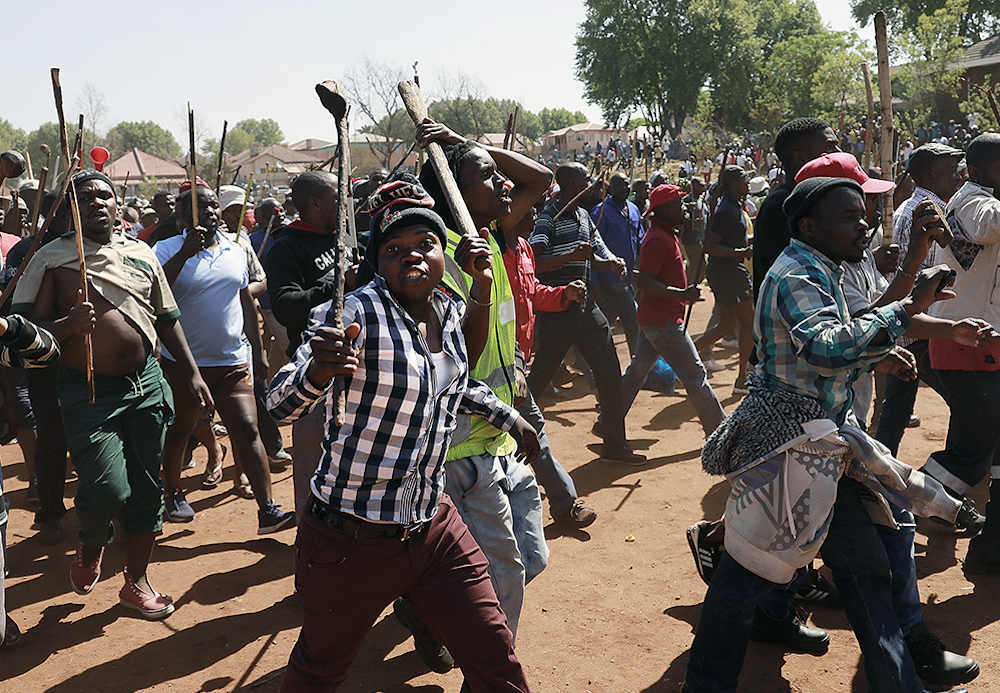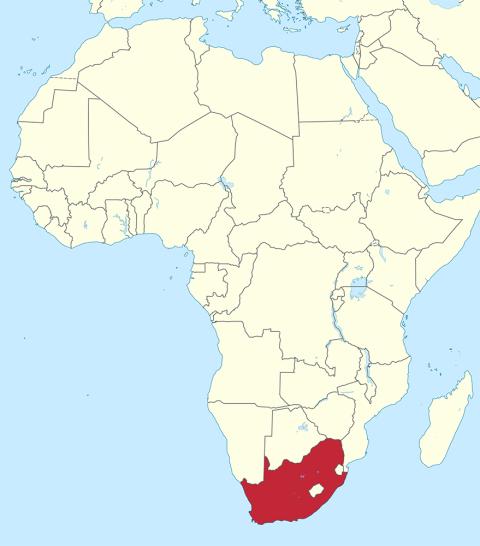
Mobs of local hostels march with homemade weapons in Johannesburg, South Africa, on Sept. 8, 2019. South African police said there have been 12 deaths since violence against foreign-owned shops erupted last month. (AP Photo)
As the latest wave of xenophobic attacks in South Africa dies out, churches in the country and others on the continent are demanding an end to the persistent problem, affecting economic migrants in one of Africa's biggest economies.
The attacks, targeting nationals from other African countries, began in early September with mobs looting foreign-owned businesses in Johannesburg, the nation's financial capital. The violence — which left at least 12 people dead — also triggered revenge attacks and looting in Nigeria, Zambia and Congo.
"The attacks jettison cultural and ideological philosophies of Ubuntu (humanity) and Ujamaa (oneness)," said the Rev. Lesmore Gibson Ezekiel, a Nigerian who heads the Peace, Diakonia and Development department of the All Africa Conference of Churches, a continentwide ecumenical group. "This culture of violence must be rejected by all with accompanying actions of entrenching a culture of hospitality."
Ezekiel urged the government and churches in South Africa to tackle the "recurrent and needless attacks on fellow Africans, who find South Africa as a safe space to thrive and (who) contribute to its well-being." He urged the churches to open their doors to the migrants seeking protection and shelter and to provide humanitarian support as well as psycho-social support to them.
"We commit (AACC) to accompany all stakeholders in South Africa and the continent … to bring to a halt all acts that project Africa as a continent that eats its own," said Ezekiel.
This is not the first time South Africa has experienced xenophobic attacks. Before the country's independence in 1994, immigrants still faced violence and discrimination. The problem continued in post-independent South Africa, with about 67 people dying between 1994 and 2008. The attacks peaked in 2008, with violence and looting targeting Mozambicans and leaving more than 60 people dead. Those attacks ended with the deployment of the army, but nearly 20,000 people were displaced and countless injured. The violence resurfaced in 2015 and 2018 and has been occurring in poor neighborhoods in Cape Town, Durban and Johannesburg.

South Africa, red, is at the southern tip of Africa. Map courtesy of Creative Commons
"Foreign African migrants are found (in) all sectors of the country's economy. There are doctors, teachers, vendors and academics. Pastors and priests are also finding space among the millions of Christians," said Tongai.
South Africa, with a population of about 55 million, estimates that more than 2.2 million foreign nationals from African countries live there. Although most migrants have arrived in search of jobs, the country's unemployment rate is estimated at 29 percent.
South Africa's president, Cyril Ramaphosa, apologized for the attacks but said they presented an opportunity for the continent to tackle poverty, unemployment and inequality, according to news reports.
While the country urged other African nations to manage the migration of their citizens, several African nations pushed back, calling on South Africa to protect their nationals.
But some South African religious leaders questioned the role of political leaders in the violence. Roman Catholic Cardinal Wilfrid Napier, who heads the KwaZulu-Natal Church group, said the clerics are concerned that some politicians are responsible for the violence through their derogatory and inflammatory statements about migrants, refugees, asylum seekers and other vulnerable people, according to the African News Agency on Sept. 9.
"Poverty and competition for scarce resources are some of the factors contributing to this violence," said Napier. "Violence is not a solution, and blaming the weak and the marginalized is not a solution."
Nigeria has taken a hard stand, saying it will evacuate about 600 of its nationals trapped in the violence. The West African country's Catholic bishops censured the attacks but also praised the response to them by the Southern African Catholic Bishops' Conference.
"We advise Nigerians living at home and abroad to be good and law abiding," said Archbishop Augustine Akubeze, the president of the Catholic Bishops Conference of Nigeria.
Noting that Nigeria and South Africa have long-standing diplomatic relations, the archbishop urged the two nations to work to solve the problem affecting their people.
Advertisement




